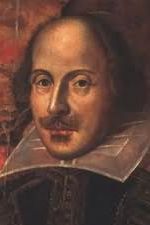Slender: I came yonder at Eton to marry Mistress Anne Page, and she's a great lubberly boy. If it had not been i' the church, I would have swinged him, or he should have swinged me. If I did not think it had been Anne Page, would I might never stir!—and 'tis a postmaster's boy.
classic line from The Merry Wives of Windsor, Act 5, Scene 5 by William Shakespeare (1602)

Added by Dan Costinaş
Comment! | Vote! | Copy! | In Spanish | In Romanian

Helena: Love looks not with the eyes but with the mind.
And therefore is winged Cupid painted blind.
Nor hath Love's mind of any judgment taste —
Wings and no eyes figure unheedy haste.
And therefore is Love said to be a child,
Because in choice he is so oft beguiled.
classic line from the play A Midsummer Night's Dream, Act I, Scene 1, script by William Shakespeare (1596)

Added by Dan Costinaş
Comment! | Vote! | Copy! | In Romanian

Shylock: I am a Jew. Hath not a Jew eyes? Hath not a Jew hands, organs, dimensions, senses, affections, passions; fed with the same food, hurt with the same weapons, subject to the same diseases, heal'd by the same means, warm'd and cool'd by the same winter and summer, as a Christian is?
line from The Merchant of Venice, Act III, Scene 1 by William Shakespeare (1598)

Added by Dan Costinaş
Comment! | Vote! | Copy!

Hamlet: Who would fardels bear,
To grunt and sweat under a weary life,
But that the dread of something after death,
The undiscovered country from whose bourn
No traveler returns, puzzles the will
And makes us rather bear those ills we have
Than fly to others that we know not of?
classic line from the play Hamlet, Act III, Scene 1, script by William Shakespeare (1599)

Added by Dan Costinaş
1 comment - Comment! | Vote! | Copy!

Troilus: Are there such? Such are not we. Praise us as we are
tasted, allow us as we prove; our head shall go bare till merit
crown it. No perfection in reversion shall have a praise in
present. We will not name desert before his birth; and, being
born, his addition shall be humble.
line from the play Troilus and Cressida, Act III, Scene 2, script by William Shakespeare (1602)

Added by Dan Costinaş
Comment! | Vote! | Copy!

Fortinbras: Go, captain, from me greet the Danish king;
Tell him that, by his license, Fortinbras
Craves the conveyance of a promised march
Over his kingdom. You know the rendezvous.
If that his majesty would aught with us,
We shall express our duty in his eye;
And let him know so.
line from the play Hamlet, Act IV, Scene 4, script by William Shakespeare (1599)

Added by Dan Costinaş
Comment! | Vote! | Copy! | In Romanian

Posthumus: Is there no way for men to be, but women
Must be half-workers? We are all bastards,
And that most venerable man which I
Did call my father was I know not where
When I was stamped. Some coiner with his tools
Made me a counterfeit; yet my mother seemed
The Dian of that time.
classic line from the play Cymbeline, Act 2, Scene 5, script by William Shakespeare (1611)

Added by Dan Costinaş
Comment! | Vote! | Copy! | In Romanian

Hamlet: Not a whit Horatio; we defy augury; there’s a special providence in the fall of a sparrow. If it be now, ‘tis not to come; if it be not to come, it will be now; if it be not now, yet it will come: the readiness is all; since no man has aught of what he leaves, what is’t to leave betimes? Let be.
famous lines from the play Hamlet, Act V, Scene 2, script by William Shakespeare (1599)

Added by Dan Costinaş
Comment! | Vote! | Copy! | In Spanish | In Romanian

Ferdinand: Let fame, that all hunt after in their lives,
Live register'd upon our brazen tombs
And then grace us in the disgrace of death;
When, spite of cormorant devouring Time,
The endeavor of this present breath may buy
That honour which shall bate his scythe's keen edge
And make us heirs of all eternity.
opening line from the play Love's Labour's Lost, Act I, Scene 1, script by William Shakespeare (1598)

Added by Dan Costinaş
Comment! | Vote! | Copy! | In Romanian

Polonius: The best actors in the world, either for tragedy, comedy, history, pastoral, pastoral-comical, historical-pastoral, tragical-historical, tragical-comical-historical-pastoral, scene individable, or poem unlimited. Seneca cannot be too heavy, nor Plautus too light. For the law of writ and the liberty, these are the only men.
line from the play Hamlet, Act II, Scene 2, script by William Shakespeare (1599)

Added by Dan Costinaş
Comment! | Vote! | Copy!

